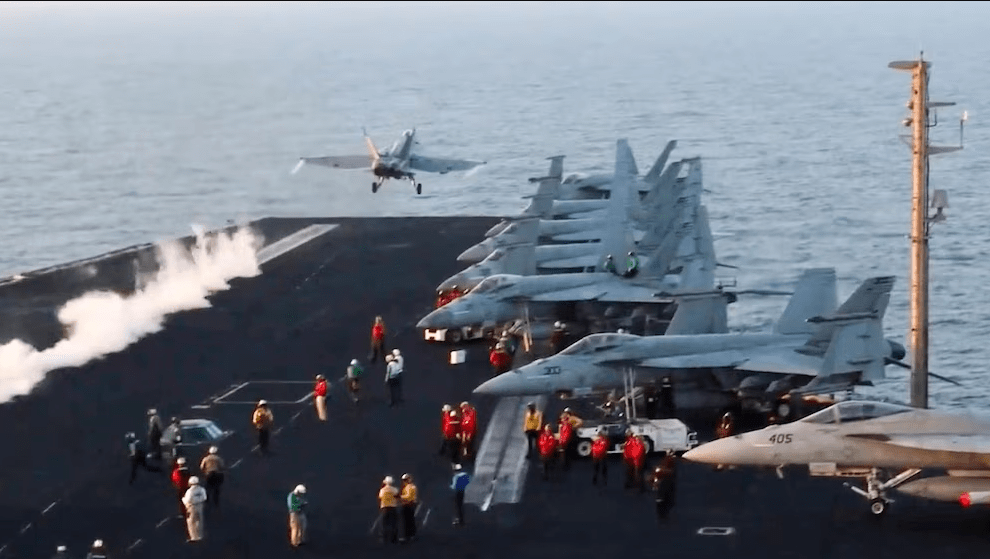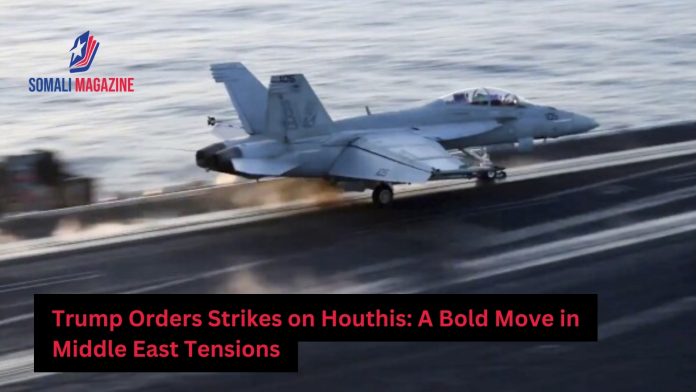Facebook Twitter Instagram Somali Magazine - People's Magazine
In a dramatic escalation of tensions in the Middle East, U.S. President Donald Trump has ordered a series of airstrikes targeting Iran-backed Houthi rebels in Yemen. The strikes, carried out on Saturday, March 15, 2025, hit multiple locations in the Houthi-controlled capital of Sanaa and other strongholds, including Saada, Hodeida, and Marib. The operation marks the first direct military action against the Houthis under Trump’s second administration and signals a hardline stance against Iranian influence in the region.
The airstrikes were launched in response to what the U.S. described as Houthi aggression against international shipping in the Red Sea, a vital maritime corridor for global trade. President Trump, in a statement on social media, vowed to use “overwhelming lethal force” until the Houthis ceased their attacks on shipping assets. “No terrorist force will stop American commercial and naval vessels from freely sailing the waterways of the world,” Trump declared. He also issued a stern warning to Iran, promising to hold the country “fully accountable” for the actions of its proxy forces.
The strikes reportedly targeted Houthi bases, missile defenses, and leadership compounds. However, the Houthi-run health ministry claimed that at least 18 civilians, including women and children, were killed in the attacks, with 24 others injured. Images circulating online showed plumes of black smoke rising from the Sanaa airport complex, which includes a sprawling military facility. Residents described the explosions as powerful enough to shake neighborhoods, with one witness likening the impact to an earthquake.
The Houthis have vowed to retaliate, with spokesperson Nasruddin Amer stating that the strikes would not deter their resistance. “Sanaa will remain Gaza’s shield and support and will not abandon it no matter the challenges,” Amer said. The group has previously threatened to resume attacks on Israeli-linked vessels in response to Israel’s blockade of Gaza, further complicating the geopolitical landscape.
The U.S. operation comes amid heightened tensions in the region, fueled by the ongoing Israel-Hamas conflict and Iran’s advancing nuclear program. Earlier this month, President Trump sent a letter to Iranian leaders offering a path to restart bilateral talks, but he has also made it clear that he will not allow Iran’s nuclear ambitions to materialize. The strikes on Yemen are seen as a message to Tehran, underscoring the U.S.’s readiness to confront Iranian-backed forces.

The international community has expressed mixed reactions to the strikes. While some allies have supported the U.S.’s efforts to protect maritime security, others have raised concerns about the potential for civilian casualties and the risk of further destabilizing Yemen, a country already devastated by a decade-long civil war. Humanitarian organizations have called for restraint, warning that the strikes could exacerbate the suffering of Yemen’s population, which is facing one of the world’s worst humanitarian crises.
The Houthis, who have controlled large parts of Yemen since 2014, have been accused of targeting over 100 merchant vessels with missiles and drones in recent years. The group’s actions have disrupted global trade and heightened tensions in the Red Sea, Gulf of Aden, and Bab el-Mandeb Strait. The U.S. has previously conducted similar operations against the Houthis under the Biden administration, but the latest strikes represent a significant escalation.
As the situation unfolds, the focus remains on whether the Houthis will heed Trump’s warning or escalate their attacks further. The strikes also raise questions about Iran’s response and the potential for broader conflict in the Middle East. For now, the region braces for the fallout of this high-stakes confrontation.

